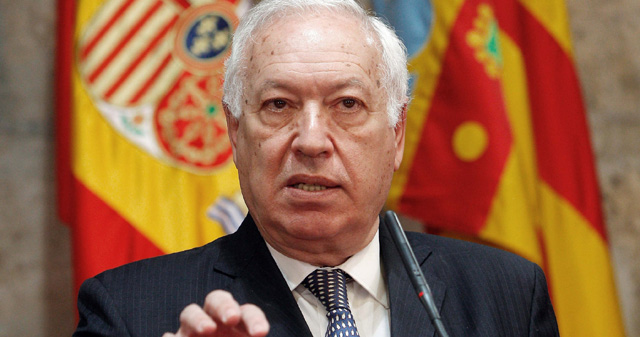By George Grant.

Tripoli, 17 December:
Drawing on its own transition from dictatorship to democracy in the 1970s, Spain offered to assist Libya . . .[restrict]in drafting the permanent constitution on Monday, during a major ministerial visit to Tripoli.
Spanish Foreign Minister José García-Margallo y Marfil was accompanied by Minister of Public Works Ana María Pastor Julián along with a delegation of 16 leading Spanish businessmen.
Margallo also carried with him a letter from King Juan Carlos to National Congress President Mohamed Magarief to pay an official state visit to Spain.
Meetings were held with both Magarief and Prime Minister Zeidan today, with the delegation having been received by Minister for International Cooperation and acting Foreign Minister Mohamed Abdulaziz yesterday.
Amongst the business delegation were representatives from Repsol (oil); Indr (technology); Sercobe (manufacturing); Sacyr Vallehermoso (construction); Idom (industry, energy, infrastructure and architecture); Cobra (engineering services); Isolux Corsán (energy, infrastructure and the environment); Ingecoms (computer technology); and Asfibe (naval construction).
Meetings were held with several business counterparts to discuss the re-entry of Spanish companies into Libya, whilst Margallo tabled an offer to establish a joint Spanish-Libyan body to examine the losses suffered by Spanish companies during the revolution and what measures would need to be taken to resolve the situation.
Significant financial losses were suffered by many international firms during the 2011 uprising, and several contracts halted. Abdulaziz made it clear that Spanish companies would be afforded the same treatment as all foreign companies in Libya. Earlier this year, the NTC established a commission to vet all pre-revolution contracts to ascertain whether they were obtained lawfully and also whether they remain appropriate in post-Qaddafi Libya.
Some Spanish companies in joint ventures with their Libyan counterparts are said to be about to restart work in the near future.
Regarding the constitution, an invitation was also extended to members of the National Congress to visit their parliamentary counterparts in Spain. Following the death of the fascist dictator Francisco Franco in 1975, Spain underwent a sometimes tortuous transition to democracy over several years, including the adoption of the Spanish Constitution in 1978 and a failed coup d’état in 1981. García-Margallo y Marfil was himself a member of the Spanish parliament at the time the constitution was drafted and passed.
Issues regarding the security sector were also on the table during the visit, including border control and the broader concerns regarding security in Mali and the Sahel. Both sides agreed on the need to revive Maghreb exchanges and cooperation on Mediterranean issues, whilst the Spanish also offered to assist in the training of the new Libyan security forces, particularly in border control.
Adding to an already extensive list was an invitation from Margallo for Libyan diplomats to receive training in Spain’s Diplomatic School.
Discussions were also held on cooperation in the field of youth and sports, including the possibility of training Libyan sports doctors and athletes.
This was the first Spanish ministerial visit to Libya since Zeidan’s government was sworn in by the National Congress on 31 October. [/restrict]










